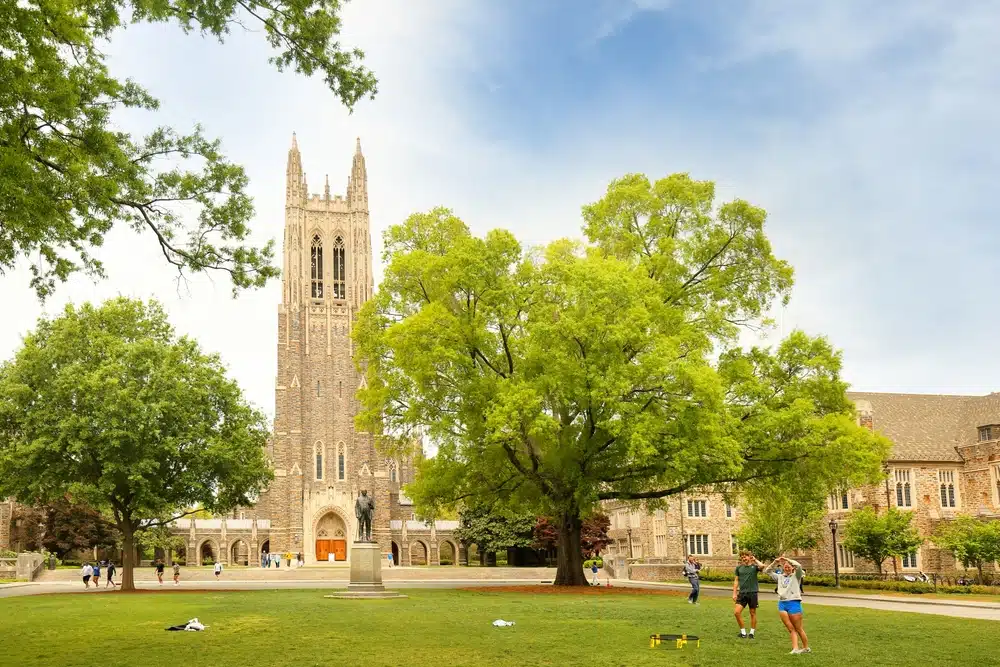Duke’s Ranking – A Deep Dive Into What Sets it Apart
Duke’s ranking consistently places it among the most prestigious institutions in both the United States and globally. Renowned for its rigorous academic programs, exceptional faculty, and vibrant campus life, Duke University has earned its place as a top-tier university that offers an unparalleled educational experience.
The university’s commitment to interdisciplinary research, diversity, and civic engagement further bolsters its impressive reputation, contributing to its steady presence in national and international rankings.
Situated in the picturesque city of Durham, North Carolina, Duke’s ranking is a reflection of the university’s unwavering dedication to academic excellence and research innovation. As one of the leading institutions in higher education, Duke continues to attract the brightest minds from around the world, offering an environment that fosters intellectual growth, personal development, and global impact.
In this blog post, we will explore the various factors that contribute to Duke University’s Ranking, highlighting the unique aspects that set it apart and make it a distinguished institution.
Overview of Duke University
Duke University is a prestigious private research institution located in Durham, North Carolina. Established in 1838 as Brown’s Schoolhouse, it has evolved into a world-class university that consistently ranks among the top educational institutions in the United States and globally. The university is renowned for its rigorous academic programs, exceptional faculty, and vibrant campus life, offering students an unparalleled educational experience that combines the best of liberal arts and professional education.
Comprising ten schools and colleges, Duke University provides a diverse range of academic programs, from undergraduate to doctoral levels, across various fields of study. Among these are the highly-regarded Fuqua School of Business, the Pratt School of Engineering, and the Sanford School of Public Policy.
The institution’s commitment to interdisciplinary research and collaboration has led to the establishment of numerous research centers and institutes, attracting top researchers and innovators from around the world.
Spread across 8,600 acres, Duke’s campus is not only visually stunning but also equipped with state-of-the-art facilities. The university’s unique blend of Gothic and Georgian architecture adds to its distinctive charm, with iconic structures like Duke Chapel and Perkins Library serving as landmarks on the campus. The university also boasts a thriving arts scene, with the Nasher Museum of Art and various performing arts venues offering students and the community access to diverse cultural experiences.
Student life at Duke is rich and varied, with over 700 recognized student organizations catering to a wide array of interests. These clubs and organizations promote social, cultural, political, and environmental awareness, fostering a sense of community among the student body. Duke is also well-known for its sports culture, with 27 varsity sports teams competing at the NCAA Division I level, and numerous club and intramural sports available for students to participate in.
Duke University is committed to making a positive impact on local and global communities. Through programs like DukeEngage, undergraduate students can participate in immersive service experiences, working on projects in areas such as environmental conservation, education, and public health. Furthermore, the university has implemented various sustainability initiatives, striving to create a greener campus and promote environmental stewardship.
With a robust alumni network, including influential figures from various fields such as business, politics, arts, and entertainment, Duke University has proven itself as an institution that fosters success and personal growth. Graduates enjoy a strong track record of employment and further education, supported by the comprehensive resources and guidance provided by the Duke Career Center.
In summary, Duke University is a distinguished institution that offers a holistic educational experience, combining rigorous academics, cutting-edge research, and a diverse campus life. Its commitment to fostering intellectual growth, personal development, and global impact has established its reputation as one of the leading universities in the world.
What is the Ranking of Duke University?
What is the ranking of Duke University? The ranking of Duke University is consistently impressive, as it maintains a prominent position among the top educational institutions in the United States and around the world. Duke’s ranking can be attributed to its strong commitment to academic excellence, innovative research, exceptional faculty, and diverse and engaging campus life. These factors contribute to the university’s stellar reputation as a leading institution in higher education.
U.S. News & World Report
In national rankings, Duke University has consistently performed exceptionally well. According to the 2022-2023 U.S. News & World Report’s Best National Universities ranking, Duke University holds the 10th position which ties with Northwestern University. This prestigious ranking places Duke among the top-tier institutions in the United States, including Ivy League universities. The U.S. News & World Report rankings are considered highly reputable, as they provide a comprehensive evaluation of universities based on a wide range of factors that contribute to the overall quality of education.
Also, Duke is in 16th place in the Best Value Schools further underscoring its commitment to providing a high-quality education that is accessible and affordable. This ranking takes into account the balance between the academic quality of a university and the net cost of attendance for a student who receives the average level of need-based financial aid.
The U.S. News rankings employ a methodology that takes into account several key indicators of academic excellence. These indicators include faculty resources, such as class sizes and faculty salaries; graduation and retention rates, which are a measure of a university’s ability to retain and graduate students; financial resources, which assess the university’s investment in instruction and research; student excellence, which evaluates the academic achievements of the incoming student body; and alumni giving, which reflects the satisfaction of graduates with their educational experience.
Duke University’s 10th position in the U.S. News & World Report’s Best National Universities ranking is a testament to its commitment to academic excellence, cutting-edge research, and exceptional faculty. Additionally, Duke’s high ranking also highlights its dedication to creating a diverse and engaging campus life, which is an integral part of a well-rounded educational experience.
Times Higher Education World University Rankings
The Times Higher Education (THE) World University Rankings is another widely respected ranking system that evaluates universities based on their teaching, research, citations, international outlook, and industry income. For 2023, Duke University held the 25th position in the THE World University Rankings and 5th in the US College Rankings of 2022. This impressive ranking further cements Duke’s status as one of the world’s leading institutions in higher education.
The THE World University Rankings employs a methodology that takes into account 13 performance indicators grouped under five broad categories:
Teaching (30%): This category assesses the learning environment, including factors like staff-to-student ratio, reputation, and institutional income.
Research (30%): The research category examines the university’s reputation for research excellence, research income, and productivity.
Citations (30%): This category measures the research influence by analyzing the number of times a university’s published work is cited by scholars globally.
International Outlook (7.5%): This category considers the university’s international collaboration, the proportion of international staff and students, and the institution’s global reputation.
Industry Income (2.5%): This category evaluates the university’s ability to help the industry with innovations, inventions, and consultancy, which reflects the institution’s practical application of knowledge.
Duke University’s 25th position in the 2023 THE World University Rankings demonstrates its commitment to delivering exceptional teaching, groundbreaking research, and fostering a global outlook. Additionally, the ranking highlights Duke’s engagement with industry partners and its impact on innovations and practical applications of knowledge.
QS World University Rankings
On a global scale, Duke University also fares quite well. In the 2023 QS World University Rankings, Duke University held the 50th position globally. This ranking system is well-regarded and evaluates universities based on six performance indicators, reflecting their academic and employer reputation, research capabilities, faculty-student ratio, and internationalization.
The six performance indicators used in the QS World University Rankings are:
Academic Reputation (40%): This indicator is based on a global survey of academic experts and evaluates the universities’ perceived academic quality.
Employer Reputation (10%): This indicator is also based on a global survey, but it targets employers to gauge how well universities prepare their graduates for the job market.
Faculty-Student Ratio (20%): This indicator assesses the level of individual attention and support students receive by comparing the number of faculty members to the number of students.
Citations per Faculty (20%): This metric measures the research output of a university by analyzing the number of times its faculty’s published work is cited in other research.
International Faculty Ratio (5%): This indicator assesses the diversity of a university’s faculty members in terms of their nationalities.
International Student Ratio (5%): Similar to the international faculty ratio, this indicator evaluates the diversity of a university’s student body in terms of its nationalities.
Furthermore, the ranking highlights Duke’s global outlook and its ability to attract students and faculty from various parts of the world. The university’s strong employer reputation also demonstrates the institution’s effectiveness in preparing its graduates for successful careers in their chosen fields.
Duke’s individual programs and schools have also received high rankings in their respective fields. For instance, the Fuqua School of Business is often ranked among the top business schools in the country, while the Pratt School of Engineering and the Sanford School of Public Policy enjoy strong reputations for their academic quality and research output.
It is essential to note that while rankings can provide a general indication of a university’s overall reputation and strengths, they should not be the sole factor in determining the value of an institution. Duke University’s high rankings are undoubtedly impressive, but its true value lies in the opportunities it offers to students, faculty, and the broader community for intellectual growth, personal development, and global impact. Ultimately, Duke’s ranking is just one aspect of what makes it a truly exceptional and distinguished institution in higher education.
Why Do College Rankings Matter?
Why do college rankings matter? College rankings play a significant role in shaping the perception and reputation of universities, including Duke University. Although rankings are not the sole determinant of an institution’s value or quality, they do provide valuable information for various stakeholders, such as prospective students, faculty, researchers, and employers. For Duke University, a consistently strong performance in these rankings is important for several reasons:
Attracting high-caliber students: College rankings act as a reference point for prospective students as they compare institutions to make an informed decision about where to pursue their higher education. A high-ranking university like Duke is more likely to attract top-tier students, who are drawn to its academic excellence, diverse programs, and supportive learning environment.
Retaining and recruiting exceptional faculty: Rankings also influence the reputation of a university among faculty and researchers. A high-ranking institution, such as Duke University, becomes a preferred destination for renowned scholars and researchers who seek to collaborate and contribute to the university’s ongoing academic and research endeavors.
Enhancing research opportunities and funding: A strong ranking often reflects a university’s commitment to cutting-edge research and innovation. In the case of Duke University, its high rankings can lead to increased research funding and collaboration opportunities, enabling the institution to maintain its research excellence and contribute to the advancement of knowledge across various disciplines.
Boosting graduate employability: Employers often take college rankings into account when evaluating the quality of job applicants. Graduates from high-ranking institutions like Duke University are likely to be perceived as well-prepared for the job market, which can positively impact their employment prospects and career trajectories.
Fostering partnerships and collaboration: Universities with high rankings tend to have a more extensive network of partnerships and collaborations, both nationally and internationally. For Duke University, its impressive rankings can lead to more fruitful collaborations with other top-tier institutions, government agencies, and industry partners, further enhancing its research capabilities and academic programs.
Strengthening alumni network: A university’s ranking can also bolster the pride and engagement of its alumni network. As Duke University consistently ranks highly, its graduates are more likely to maintain a strong connection with the institution, which can result in increased support, mentorship, and philanthropic giving.
College rankings matter for Duke University as they contribute to its reputation and prestige, attracting top-tier students and faculty, and fostering research and collaboration opportunities. While it is essential not to solely rely on rankings when evaluating an institution, Duke’s strong performance across various ranking systems is a testament to its commitment to providing an exceptional educational experience and maintaining its position as a leading institution in higher education.
What is the Benefit of Duke’s Ranking in College Application?
What is the benefit of Duke’s ranking in college application? Duke University’s impressive ranking can positively impact college applications in various ways, providing both tangible and intangible benefits for prospective students. Some of the key advantages of Duke’s high ranking during the college application process include:
Reputation and Prestige: Applying to a highly-ranked institution like Duke University adds a level of prestige to a student’s application. Duke’s strong rankings reflect its commitment to academic excellence, research innovation, and vibrant campus life, which can enhance the appeal of the university for prospective students.
Academic Excellence: Duke’s ranking signifies that the university consistently delivers top-quality education and maintains a highly qualified faculty. As a result, prospective students applying to Duke can expect to receive an outstanding education that equips them with the necessary knowledge and skills to excel in their chosen fields.
Competitive Edge in the Job Market: Graduating from a top-ranked institution like Duke University can give students a competitive edge in the job market. Employers often regard graduates from highly-ranked universities as well-prepared for their careers, which can lead to better employment prospects and potentially higher starting salaries.
Networking Opportunities: Highly-ranked universities, like Duke, tend to have strong alumni networks and connections with industry professionals. By applying to Duke, students can tap into this extensive network, opening up potential opportunities for internships, job placements, and mentorship.
Research and Collaboration Opportunities: A high-ranking university like Duke often attracts more research funding and fosters collaborations with leading institutions, government agencies, and industry partners. As a result, students at Duke have access to state-of-the-art facilities, resources, and opportunities to participate in cutting-edge research projects.
International Exposure: Duke’s ranking can also enhance students’ international exposure. Top-ranked universities often attract a diverse student body and faculty from various countries, which can lead to a rich multicultural experience and global connections that can benefit students throughout their careers.
Financial Aid and Scholarship Opportunities: Applying to a prestigious university like Duke can increase a student’s chances of receiving financial aid or scholarships. Duke is committed to making its education accessible and offers generous financial aid packages to students with demonstrated needs. Moreover, its high ranking can make it more likely to receive funding for merit-based scholarships.
While the benefits of Duke’s ranking during the college application process are significant, it is crucial for prospective students to consider additional factors such as personal fit, campus culture, and specific program offerings when making their final decision. College rankings should be viewed as one of many factors to be taken into account during the college selection process.
Want to learn more about your chances of getting into Duke? You’ve come to the right place. At AdmissionSight, we have over 10 years of experience guiding students through the competitive admissions process.
AdmissionSight can help you put your best foot forward when applying to college this fall. Contact us today for more information on our services.









































